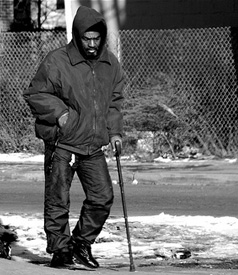Honest, paywall-free news is rare. Please support our boldly independent journalism with a donation of any size.
The Bureau of Labor Statistics recently released employment data for March. Many analysts agree that the numbers show the first substantial gain for payrolls since December 2007. Nonfarm payroll employment increased by 162,000 and the unemployment rate held steady at 9.7 percent. According to Mark Zandi, chief economist of Moody’s Analytics, “The US economy has ‘turned the corner,’ but it will still take up to five years to regain all the jobs lost since the economic collapse …”
This is encouraging news on a number of fronts. However, a closer look reveals some frightening realities that lay behind the positive indicators. For African-Americans in many regions of this country, the numbers reflect a tale of two cites: “It was the best of times, it was the worst of times … it was the spring of hope, it was the winter of despair.” In March 2010, while the unemployment rate for the country was 9.7 percent, the national unemployment rate for African-Americans was almost double at 16.6 percent. On the state level, according to the Economic Policy Institute’s forth quarter 2009 numbers, the unemployment rate in Michigan for African-Americans was 22.3 percent, California 15.5 and New York 14.6.
As disturbing as the unemployment numbers are for African-Americans, they don’t begin to tell the whole story. When these numbers are viewed in the context of other factors such as the disparity in median family income, wealth accumulation and poverty levels, they indicate that an entrenched systemic social policy problem exists for African-Americans that a jobs recovery will not address.
According to 2007 US Census Data, white families made 62 percent more than black families. The median family income for white families was $54,920, while the median income for black families was $33,916. Based on data from the 2002 Survey of Income and Program Participation, white median household net worth was about $90,000, compared to a mere $6,000 for the median black household. For white families, 8.2 percent were (this is data from 2007) living in poverty compared to 24.5 percent of black families. As Dr. Ronald Walters explained in “White Nationalism Black Interests,” these indicators of greater social instability loom large for a substantial portion of the black community that has not benefited from the economic system.
Some members of the Congressional Black Caucus (CBC) are expressing concern that they are not receiving a significant level of support from President Obama and his staff, claiming that the administration has not done enough for African-Americans. According to POLITICO, House Judiciary Committee Chairman John Conyers (D-Michigan) said that white House officials are “not listening” to black lawmakers and Rep. Alcee Hastings (D-Florida) said, “there’s not enough attention to poor people.”
According to The Washington Post, other members of the CBC, such as Emanuel Cleaver II (D-Missouri) and Donald Payne (D-New Jersey), are expressing their frustration regarding how to address these issues. “How can you express criticism of the administration without eventually confronting the man at the top?” The article continued, “Some (CBC members) say that any public airing of their disagreements with Obama runs the risk of politically damaging the president and ultimately slowing the advancement of other African-Americans.”
Why is holding the president accountable a problem? Of what are members of the CBC afraid? With 24.5 percent of African-American families living in poverty, a median household net worth of $6,000 and a national unemployment rate for African-Americans almost double the national average, how much slower can African-American’s advance? Are the same figures that were unacceptable for a white president somehow acceptable under an African-American president?
Why should they be concerned about political damage to a president who, by their own admission, feels that key members of the Obama administration, “have taken them for granted, in the belief that black members of Congress have no stomach for a fight with the country’s first black president”? According to POLITICO, a CBC aide said that senior aide Valerie Jarrett has “canceled lunch plans with the caucus eight times and that her office is slow to return calls and pays more attention to longtime supporters than to senior CBC members.”
Since the CBC is so frustrated and confused, here are a few suggestions for them to consider proposing to President Obama:
1) Work with the SBA and insurers such as AIG to back African-American owned business that are having difficulty meeting bonding requirements as they pursue government contracts (stimulus package projects) as prime and subcontractors.
2) Resurrect the ’98 Clinton administration SBA plan to enhance access to debt/equity capital via SBA guaranteed loans for African-American owned businesses.
3) The Senate and House Small Business Committees should mandate that the SBA enforce federal agency subcontracting plans. Liquidated damages have rarely if ever been enforced against a noncompliant government contractor. CBC members probably have numerous African-American owned firms in their districts that would benefit from enforcement efforts in federal contracting.
Members of the CBC chair four committees and 18 subcommittees. If they cannot leverage their power and effectively develop legislation and social policy that address the systemic ills impacting African-American progress, an increasing number will continue to experience the worst of times in a season of darkness.
Media that fights fascism
Truthout is funded almost entirely by readers — that’s why we can speak truth to power and cut against the mainstream narrative. But independent journalists at Truthout face mounting political repression under Trump.
We rely on your support to survive McCarthyist censorship. Please make a tax-deductible one-time or monthly donation.
